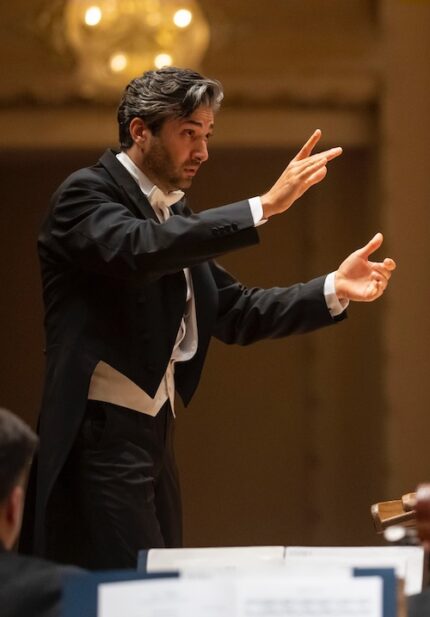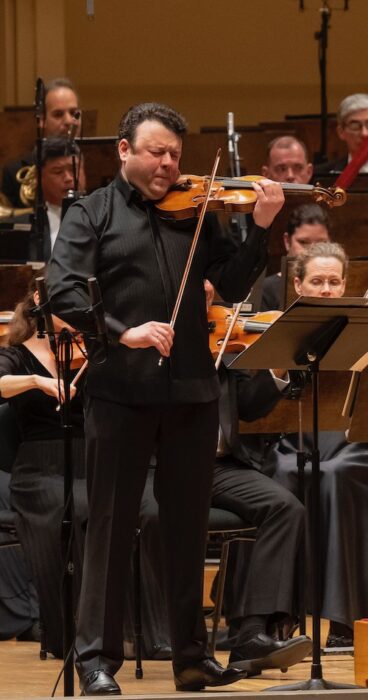More force than finesse in Afkham’s French program with CSO

It was not a night for pianissimos. Or subtlety.
French fare has been in short supply this season at Orchestra Hall, so one looked forward to the largely Gallic repast with conductor David Afkham leading the Chicago Symphony Orchestra Thursday night. The musicians played with customary polish and commitment, yet while there were worthy moments in works of Ravel and Debussy, the performances overall proved greater on force than finesse.
In an interview in the CSO program book, Afkahm credits Bernard Haitink as an influential mentor. Haitink, former principal conductor of the CSO, was a masterful Debussyian and one wished for more of the late Dutch maestro’s objectivity and nuance in the evening’s performance of La mer.
There was little sense of mystery or evocation in the opening bars of Debussy’s tripartite ode to the sea, a symphony in all but name. Afkham’s pacing and balancing were accomplished enough and he built the opening movement to an imposing climax.
Yet under the German conductor, Debussy’s half-tones and pastels were consistently lit in neon. There was scant charm in the central section, William Welter’s oboe playing apart. Afkham whipped up a Wagnerian tempest in the finale sufficient to set off a tsunami but mostly left Debussy’s scoring subtleties submerged.
A pair of Ravel works centered on the dance framed the evening.
The Menuet antique (1895) was the composer’s first published work and set the stage for Ravel’s method of orchestrating his piano works (in this case, the two versions were separated by 34 years). Afkham led a robust, big-boned reading that underlined Ravel’s quirky and distinctive scoring.
Coming after the boisterous Debussy performance, La valse almost seemed like programmatic lily-gilding. But in fact, Ravel’s “choreographic poem for orchestra” received the most satisfying performance of the evening.
It helped that Afkham seemed better suited to La valse than the other works on the program. While here too the conductor leaned on the volume button, Ravel’s pointed deconstruction of the Viennese waltz (1919-20) can handle a degree of extra punch.
Afkham allowed the waltz theme to emerge artfully from the gloomy murk of the opening pages and skillfully charted its progression, subversive transformation and eventual collapse, a sonic reflection of postwar disillusionment with facile entertainments.
The CSO winds were stellar throughout, making Ravel’s music into a virtual large-scale concerto for orchestra. Especially notable were the characterful contributions of guest bass clarinet Pavel Vinnitsky and CSO tubist Gene Pokorny. (Note: Pokorny will make a rare CSO solo appearance in Lalo Shifrin’s Tuba Concerto June 15-17.)
The evening’s non-French outlier was Shostakovich’s Violin Concerto No. 1 with Vadim Gluzman as soloist.
Shostakovich famously kept this piece in a drawer until after Stalin’s death. The sense of a deeply felt personal journey is unmistakable—musical, emotional, and political—in four contrasted movements that begin in the depths of despair and end in a burst of fizzing, triumphant virtuosity.
Like most of Thursday night’s concert, the performance of the finest violin concerto of the 20th century proved similarly uneven.

Gluzman played with customary technical assurance and focused tone but his straitened dynamics and narrow expressive range found little edge or intensity in the tragic opening Nocturne. That curiously tepid quality continued through the unsettled, jabbing Scherzo. Even in the Passacaglia, Gluzman played with a kind of generalized ardor, never digging beneath the surface to explore the depths of bleak rumination in the music. In 2023, it’s surprising that a musician born in Ukraine wouldn’t find greater empathy with a score that personifies defiance against Russian oppression.
The low-voltage performance sprang to life in the extended cadenza. Here Gluzman played with greater freedom and individuality, his spacious rendering belatedly finding some deeper feeling beyond the notes. There was a clear sense of struggle against malign forces in the ratcheting up of tempo and solo complexities, and the composer’s DSCH motif emerged with resounding impact.
The fail-safe Burlesque conclusion delivered its bravura fireworks in energized fashion, though the sense of victory felt decidedly hollow for the slighting of the score’s earlier tragedy. As in the French works, Afkham’s accompaniment stayed on the near side of loud throughout.
The program will be repeated 1:30 p.m. Friday, 8 p.m. Saturday and 7:30 p.m. Tuesday. cso.org
Posted in Performances



Posted Jun 03, 2023 at 11:13 am by George Young
Those were exactly my thoughts from the very opening measures of ‘Menuet Antique’: “Oh boy, there aren’t going to be any expected subtleties of French expression coming up here”. “Blaring” is the word that immediately came to mind. And yes, it wound up serving him best later in ‘La valse’, just as you characterized it.
Posted Jun 04, 2023 at 2:28 pm by Sheldon Nahmod
I saw and heard nothing low-voltage at all in Gluzman’s Shostakovich Violin Concerto performance. Simply outstanding imo.